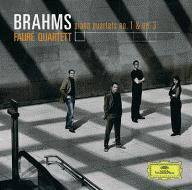Acclaimed Fauré Quartett returns to Deutsche Grammophon with their first recording of Brahms
 The Fauré Quartett continues to add authoritative recordings to the chamber music catalog with their new recording of two Brahms quartets, available from Deutsche Grammophon on January 12, 2010. These large, some say symphonic, works test the limits of technical and musical capabilities, and the Fauré Quartett once again proves why they are one of the most acclaimed ensembles performing today.
The Fauré Quartett continues to add authoritative recordings to the chamber music catalog with their new recording of two Brahms quartets, available from Deutsche Grammophon on January 12, 2010. These large, some say symphonic, works test the limits of technical and musical capabilities, and the Fauré Quartett once again proves why they are one of the most acclaimed ensembles performing today.
Within a short period of time the Fauré Quartett has conquered the great concert halls of London , Paris , Berlin , Amsterdam , Brussels , Geneva , Hamburg , Frankfurt, Milan , Buenos Aires , Rio de Janeiro and elsewhere. “They attract superlatives wherever they go,” wrote The Strad following a concert at London ’s Wigmore Hall, while the Süddeutsche Zeitung praised them for a performance that “brought tremendous pleasure by highlighting interpretative details that had scarcely ever been heard before”.
The Fauré Quartett strives to achieve a unique sound for Brahms (as indeed for every work) because their guiding principle is one of depersonalizing themselves as individuals and trying to collectively step into the shoes of the composer. They cite an objective formulated by Sergiu Celibidache: “Where is the ‘interpretation’ in what we do? I do nothing but find out what the composer intended, for he experienced something and sought an appropriate form of shorthand to commit it to paper. We begin with that shorthand in order to arrive at what he experienced.”
These works are typically “Brahmsian” and are reputed to be brittle and full of melancholy as well as indicative of Brahms’ obsession with the symphonic ideal and his ability and tendency to compose “symphonic” chamber music. Indeed, Arnold Schoenberg took it upon himself to fully orchestrate the first quartet “in order to hear everything for once.” By stepping back and truly examining what Brahms was feeling emotionally and trying to achieve technically, the Fauré Quartett is able to bring their fresh and revitalizing interpretation to audiences both live and on record.

Comments